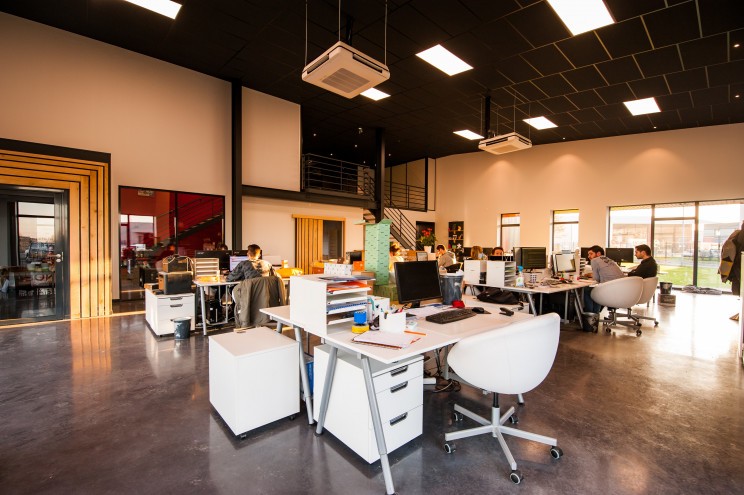
When you think of the real estate sector you probably think of houses and apartments, but this important sector of the economy does not only comprise the residential segment. And if the business of buying and selling houses was again the talk of the town in 2021, just like renting, commercial real estate was also on the rise. The office sector, logistics and the niches related to student and senior housing, for example, were also on the agenda. One thing seems to be certain: Portugal remains on the radar of national and foreign investors, who are looking to the country as the ideal place to expand their businesses.
Logistics at its best
Logistics was crowned as one of the winning sectors of the Covid-19 pandemic, much to the credit of the explosion of e-commerce globally. Occupation of logistical assets has soared to such an extent that there is now little supply for such demand. In order to explore this business area, US giant Goldman Sachs Asset Management announced that it will invest more than a billion euros in Portugal and Spain, with the aim of developing new logistics platforms over the next three years.

This is a trend, incidentally, that had already been seen in 2020, following the sudden appearance of the Covid-19 pandemic. In that year, 272,000 square metres (sqm) were occupied in warehouse and logistics space in Portugal, which represents a growth of 24% compared to 2019, and is also the third highest figure ever in Portugal, according to the consultancy firm CBRE. In the year just passed, the sector grew even more and several companies have announced expansion plans in Portuguese logistics real estate in 2021

Demand for office space in Portugal buoyant
"Portugal is a land of growth and opportunities for our business", Jean-François Couëc, Managing Partner of the Kardham group, which has its eye on Portugal, namely in the office real estate segment, told us in October. Also Pedro Lancastre, CEO of JLL, in the middle of the year, woke up to the fact that there is real demand for this sector in the country. Another report, this time by Savills, estimated that the real estate sector would reach pre-pandemic levels by 2022, with the office segment standing out, specifically in Lisbon.
In parallel, and with teleworking "gaining ground", many companies are adapting their office spaces, or even investing in new infrastructures. On the subject of remote work, it is important to say that Lisbon was considered the third best city in the world to telework, only behind Bangkok, in Thailand, and New Delhi, in India. Curious? Read more in our article about Lisbon's success with remote working.

Investing in student residences? Yes...
There are many investors who consider Portugal an attractive country for the student residences segment. 2021 was, in fact, fertile in news that proves this, with the opening of several accommodations directed to this niche market. "Portugal presents itself as one of the markets with the greatest potential for the development of Purpose-Built Student Accommodation (PBSA) projects," said Alexandra Gomes, Head of Research at Savills Portugal, recently, adding that Lisbon should be one of the most attractive locations at a European level in this sector.
One of the units that opened doors this year in the country (in Porto) was Studyou, which is located in the Asprela university complex and has, for example, a cinema room, a bar and a garden with barbecue. And it is far from alone as there are several other student residences currently under construction in Porto alone.
In Lisbon, a student residence in the west wing of the passenger building in Santa Apolónia, which will have at least 173 beds, will come to fruition this year, with others in the pipeline, such as one in Alta de Lisboa. In the capital, by the way, there is one student residence that has adapted to the new reality brought by the pandemic. We are talking about the My Home In The City residence, which is now also "housing" young workers and not just students.

Senior residences, an opportunity in the sector
The trend of growth in investment in senior residences is now clearly an undeniable fact of the real estate sector today. According to a CBRE study, in less than 30 years, more than a third of the resident population in Portugal will be senior, which is equivalent to a total of 3.3 million people, and in order to respond to this demographic evolution, 55,000 more beds will be needed in senior residences.
Another report, this time from Savills, concluded that the segment of residences for senior living and homes for the elderly is attracting more and more investors, being seen as one of the most attractive sectors at the moment. One of the investors that is eyeing this segment is the Spanish company Thor, which will enter Portugal with three residences for the elderly: each one will have 120 beds and will be located in Setúbal, Guimarães and Algarve.
This segment of the real estate sector is incrtedibly broad, with many niches within it that you may not think of immediately, but which represent real investment opportunities. One of these niche markets to take into account comprises LGBTI+ seniors. In an interview with idealista/news, João Passos, a real estate consultant at Remax and president of Variações - the Association of Trade and Tourism LGBTI of Portugal - explained that this niche in the senoir residences market is already showing clear successes in Spain, and has the potential to shine through the market in Portugal too.